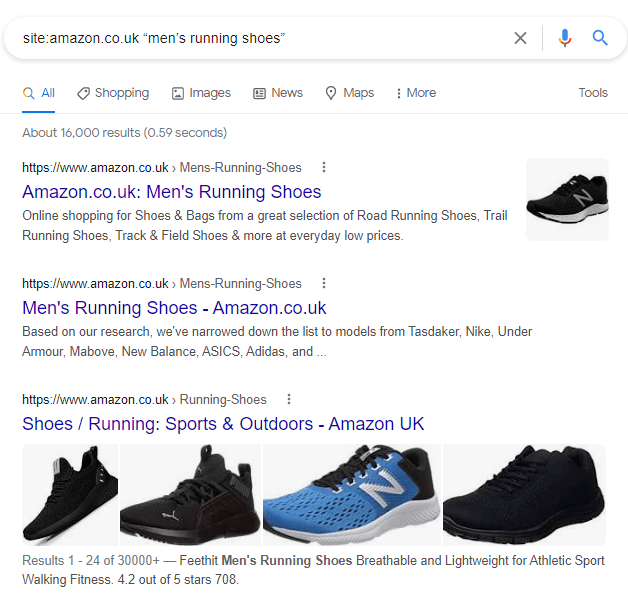“If you have more pages, it means more opportunity to rank, right?”
Somehow this notion persists despite years of proof that it does much more harm than good.
“But Amazon rank above me multiple times for [insert generic phrase here].”
Yeah, because it’s Amazon, not because they have more than one category page for shoes. Anyway…
What is Internal Keyword Cannibalisation?
Internal keyword cannibalisation is a persistent issue across many sites and it basically boils down to overlapping keyword targets across multiple URLs on your domain. Instead of multiple versions of different pages, you should make sure that your keywords are split out and assigned to different pages so that you don’t have close, competing content.
Duplicate content from one domain to another is bad and understood to be so, so why would you encourage it on your own domain?
How Bad Is It For My Site?
Bad. Think of the time and effort you put into the two competing pages on your domain. The backlinks, internal linking, optimsations, content, etc. All of this is needlessly doubled when you should be focusing on one page for this term.
Historically Google has sometimes ranked multiple URLs from one domain, but now it is much better and has focused on diversity of search results in updates over the last year or two.
Sometimes you might see a certain keyword which you might think is better suited for another page to rank. This is the start of keyword cannibalisation, but you need to look deeper to find out if this is a one-off or a deeper trend.
Example
A shoe shop’s homepage could rank well for “men’s shoes” rather than the men’s shoes category. This doesn’t mean you need to tear your category page apart. Instead, look at all the keywords both pages are ranking for and tailor the pages to fit. Fixing cannibalisation does require investigation to fix, and there isn’t a one-size-fits-all solution (yes, that pun was intentional).
User Intent
There is also user intent to take into account. Your shoe website is going to mention shoes a lot, obviously. But when you talk about the different types, are you targeting transactional keywords like on category pages – or informational pages like blog posts? When you have the overlap, that’s when you get content & SEO cannibalisation issues.
Caveat: This ignores branded searches where you might want to see the homepage and other popular pages. For this we are talking about generic terms where you compete directly with other domains.
How Do I Identify Cannibalisation Issues?
There are a few ways to go about finding these potential issues though – from fairly automated tools and services to manual searches. All have their positives and negatives and it’s worth manually checking some keywords even if you pay for top tier SEO tools. Also, it will be best to use a few methods to get more aggregated info rather than just doing one and making a possibly incorrect decision.
Here are a few of the best methods:
Use The ‘site:search’ Operator
Probably my favourite search operator, using “site:[domain]” in Google will just return results from that domain.
Add onto this your search term and you can quickly see what the most relevant pages are for that term. This works with and without quotation marks around the search terms, giving varying results.
So, your full search term will be something like this:
site:amazon.co.uk “men’s running shoes”
 The results you get will go from the most related to least, so you will probably just want to look at the first few to see the really close pages.
The results you get will go from the most related to least, so you will probably just want to look at the first few to see the really close pages.
Historic Rankings
You’re probably tracking keyword rankings in one way or another – either through dedicated tracker tools, 3rd party SEO tools or even manually checking them.
Either way, you should have some way to see what page is ranking for what keyword. You then want to see what the URL is and if this URL has changed over time.
Depending on what page you have on your site, this may be natural. If the URLs are changing n unexpected ways or they are switching between two, then it could be a good indicator that you have competing pages.
You may see some seasonal changes and you need to be careful of the dates you monitor when doing this though. If you just look at 2 dates you could easily miss a change in between, missing a potential issue. Take a few dates and look closer for the differences in ranking URLs.
Content Audit
I won’t go into the details of a content audit here, but finding the strengths and weaknesses will help you also see competing pages and content cannibalisation.
Looking further into the organic sessions of pages and other GA data over different date ranges can also help you see fluctuations in content performance. Similar to the above, you could have 2 pages which compete and switch between which one gets the most traffic.
Multiple Ranking URLs
From your tracked keywords or by using 3rd party tools you will often see certain terms which have 2 ranking URLs. This could be correct on occasion, but generally it will be a sign of conflicting pages.
The more generic a term the higher the chance that this is an issue as well. If you have two ranking URLs in the top 100 for very niche terms, then this is probably fine. Similarly, you should ignore branded terms, as you should have more than one URL ranking for branded terms!
Caveat: This can be seen when algorithms change or during other ranking fluctuations. Don’t take 1 snapshot into account, but make changes when this is a more persistent issue.
Use Google Search Console
Search console can give you much of the data from the points above, but it isn’t always user friendly or accessible.
You can download or export this data to Google Sheets, but it might be incomplete. For more data it will be beneficial to use 3rd party connectors and tools to get the full picture.
The performance report can show the keywords, URLs and average rankings, and by taking snapshots of weeks or months you can see how things change – giving you the locations of potential cannibalisation.
How Do I Fix Keyword Cannibalisation?
To find these issues the ideas are fairly simple: Merge potential competing pages, or re-target them through optimisation and onpage changes so that they reach different keywords.
As with most SEO, the devil is in the detail.
I’ve said “potential” issues a few times, and they are just that. Some SEO experimentation will fail and you would have been better to keep the two pages, but you need to take into consideration all aspects of page performance.
Sometimes it’s clear cut and you will see a page with 200 words against a 1000 word page. The same goes with links, keywords, traffic and many other factors. If the performance difference is there, then you can make a solid decision.
If the two pages are close in terms of these factors then it can be more difficult. If you have good positions you have something to lose, but if your 2 pages are languishing around position 50 in the results, why not take the risk?
Make sure that you monitor the performance of your organic traffic, revisit changes in a month or more, and generally keep track of the changes you make so that you can make more informed decisions in the future.

